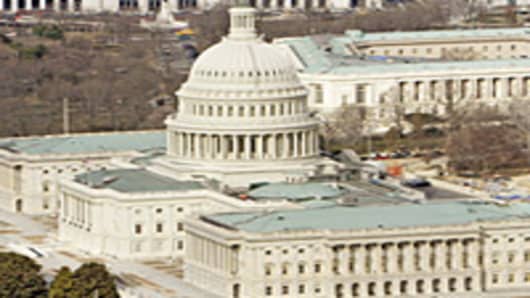Many of the same people decrying the current budget deficit are the same people who not only cheerled the annihilation of the Clinton budget surplus but also cared not at all about how to pay for two wars while providing budget busting tax cuts. House GOP Leader John Boehner, who has apparently come down with a severe case of amnesia when it comes to fiscal responsibility, criticized the majority for spending money with “reckless abandon,” despite being one of the largest enablers of deficit spending during the Bush years.
Boehner’s party, which tried to privatize Social Security as recently as four years ago, has also become staunchly defensive of the status quo when it comes to what it claims is protection of senior entitlements. But as any honest analysis of the long-term federal budget will show, the growth in health care entitlement spending – and Medicare specifically – is the largest budget buster there is. The same deficit hawks who oppose serious health care reform are simply just contributing to the deficits they claim are such a huge problem.
According to projections, health care costs will consume over one-third of our GDP in 30 years if the status quo were to continue. Despite the ranting of some town hall attendees, Medicare and Medicaid are government programs whose expenditures are directly tied both to demographics and the cost of health care. A growing retiree population, coupled with the exponentially rising cost of care, will spell doom for federal and state budgets alike in the next several decades.
Tort reform, allowing the purchase of health insurance across state lines and other “proposals” by opponents of meaningful health care reform do not begin to bend the cost curve that is required to eradicate this looming budget crisis. According to a 2004 CBO study (released under a Republican controlled Congress), medical malpractice costs account for less than 2% of total health care spending. To claim that tort reform is a panacea for cost containment is disingenuous at best.
Health care reform cannot be enacted in a piecemeal approach, as some have advocated, precisely because a real overhaul is needed in order to prevent long-term fiscal disaster. The alternative is to tinker at the edges, play politics and debate the fake existence of red herrings like death panels as costs continue to spiral.
At some point in the not too distant future, some president will have to look Americans in the eye and tell them that massive tax increases are needed and benefits must be drastically cut or eradicated because politicians in 2009 failed to enact reform that would have gotten our fiscal house in order. At that point, the naysayers of today, if they are ideologically consistent, will be forced to vote for politically suicidal policies in order to get our deficit under control. More likely, most of them will continue to play politics, embrace the selective amnesia that Leader Boehner and his cohorts have come to exemplify so well, and claim that unsustainable budget deficits are really not so unsustainable after all.
_________________________
Julie Roginsky is a CNBC contributor who has extensive experience in government, politics and public relations on both the federal and state levels including serving as the Washington communications director for former Senator Jon Corzine.


